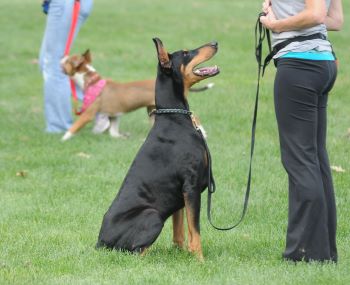Dog training

Photo by Depositphotos
Did you just get a new puppy? You're not the only one. The pandemic has seen an increase in pet adoptions. But with all the required social distancing due to COVID-19, we may be creating a generation of unruly dog brats. The best way to safely socialize and train your puppy may be with a dog trainer. But how do you find a good one?
You may want to start at the American Veterinary Society of Animal Behavior. As they state, training of dogs should be based on positive reinforcement. The pup should be rewarded for doing the right thing, not punished for doing the wrong thing. We all learn better this way. The trainer should show you and your dog respect. After all, communication is vital between all parties for the training to go well. If you think you've found a trainer you like on paper, ask to observe a class to see if you like them in person. How is the trainer interacting with the owners and the dogs? Are you comfortable with the interactions? Is the trainer explaining what the exercise will be, why it is important, and are they able to demonstrate it?
The Association of Professional Dog Trainers also has information on seeking a dog trainer. Like the AVSAB, they encourage a similar philosophy of rewards and asking questions of a prospective trainer. Additionally, they explain some of the myths about dogs and their behavior, such as the one that dogs have to be 6 months old to start training. In reality, they should start as soon as possible, even before getting their rabies vaccines. The puppy vaccine series starts at 6-8 weeks of age with the rabies vaccine generally given at 12-16 weeks, depending on local laws.
Speaking of which, part of safely training your dog is to make sure all the participants are healthy and have had their first set of vaccines. Sick puppies should be kept home until feeling better. (Does this all sound familiar these days? You might want to ask what is required of the humans as well.)
Also, pay close attention to the training your trainer has received. In the United States, anyone can call themselves a dog trainer, no education or licensing required. While some folks are terrific, there are horror stories of trainers harming or killing dogs. Anyone who has looked for a trainer knows that there is an alphabet-soup of potential initials after any trainer's name. Many of these are certifications indicating some sort of education in how to be a dog trainer. For instance CPDT-KA and CPDT-KSA indicate assessment by the Certification Council for Professional Dog Trainers. (The “KA” means Knowledge Assessed and the “KSA” means Knowledge and Skills Assessed. Learn more about the various initials.)
Realize that a dog trainer is very different from a veterinary behaviorist. Veterinary behaviorists are board certified They must first become veterinarians, then complete an internship or its equivalent, then complete a residency or its equivalent. After all that formal education, they must complete the steps for board certification (e.g. performing research, writing peer-reviewed papers, and passing a multiday examination). This path is different from the International Association of Animal Behavior Consultants. This organization works to offer educational opportunities to non-veterinary behavior consultants. While these behavior consultants and dog trainers may work with veterinarians (whether general practitioners or board certified behaviorists), only they can determine if a behavior problem is caused in part or in whole by a medical issue, and only they can prescribe medications.
Regardless of who you ultimately work with to train your dog, I caution you against seeking training advice solely from television shows or YouTube channels. While some of the information may be useful, it can be difficult to sort the wheat from the chaff. Additionally, sometimes it takes someone who knows what they're doing watching you and your interactions with your own dog to see what needs to be changed to improve training and behavior of your dog. A celebrity on television or the internet can't do that. It is also important that the whole family be involved in the dog's training. This should reduce the number of mixed messages the dog receives about what is expected of them. It's not just your dog that is being trained but also the people in your dog's home!
The bottom line is, do your research. Finding a good dog trainer is not necessarily easy but the reward of your efforts is worth it. A well-trained dog is a pleasure to have for a lifetime.